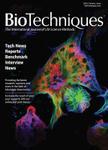版权所有:内蒙古大学图书馆 技术提供:维普资讯• 智图
内蒙古自治区呼和浩特市赛罕区大学西街235号 邮编: 010021

作者机构:Univ Tubingen Inst Human Genet Microarray Facil Tubingen D-72076 Tubingen Germany
出 版 物:《BIOTECHNIQUES》 (BioTechniques)
年 卷 期:2010年第48卷第5期
页 面:371-378页
核心收录:
学科分类:0710[理学-生物学] 071010[理学-生物化学与分子生物学] 07[理学]
主 题:Affymetrix GeneChip microarray hybridization gene expression profiling sample tracking microarray quality control
摘 要:Microarrays evolved from a highly specialized technique into a standard molecular biology method that is widely used for whole-genome gene expression profiling. One of the most important aspects of this method is sample identity, that is, whether the expression profile recorded from an array actually derives from the indicated sample. Several potential steps in the protocol exist where a mix-up of samples may occur. With the increasing size of microarray studies, it is important to ensure that each expression profile is assigned to the correct sample. Errors at this level almost certainly lead to erroneous results and can even cause a complete failure of the microarray study. We developed a system that utilizes probes already present on commercially available Affymetrix arrays to unambiguously correlate the recorded expression profile with the input sample RNA. A set of eight spike-in controls were generated, which can be added to sample RNA in different combinations to generate an on-chip identifier that passes through the entire array processing protocol and results in a sample-specific hybridization pattern. This pattern can then be used to monitor whether each array was hybridized with the correct sample. The spike-in controls did not have any negative effect on RNA integrity or any detectable influence on the expression values of the remaining probes on the array;therefore, these controls represent an inexpensive and easily adaptable system to guarantee high-quality results from microarray experiments.